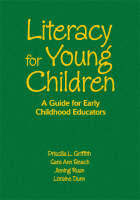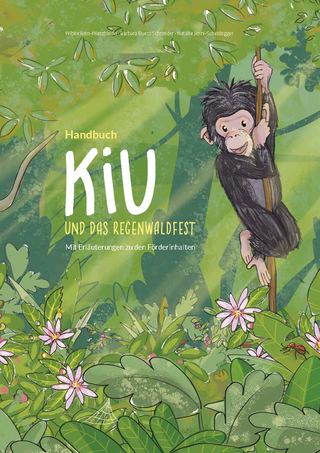
Literacy for Young Children
Corwin Press Inc (Verlag)
978-1-4129-5199-9 (ISBN)
"This book merges the five big ideas in reading with developmentally appropriate practice to create a practical guide that will enhance literacy development in any type of preschool setting. The references, resources, and examples will help teachers bring these ideas to life in their classrooms."
—Addie Gaines, Principal
Kirbyville Elementary School, MO
Use research-based strategies to build early literacy skills!
Early childhood educators recognize that young children are more likely to succeed in later grades if they have a variety of engaging preschool experiences. Literacy for Young Children brings together reading research and learning standards to help teachers become informed decision makers about meeting the literacy needs of young students from diverse backgrounds.
Based on the authors′ work in Early Reading First classrooms, this resource includes evidence-based, easy-to-implement activities to develop oral language, phonological awareness, print awareness, emergent writing, and early comprehension skills. Chapters provide an overview of each skill, methods for assessment, and appropriate instructional strategies. The book showcases examples of PreK and kindergarten children from different cultural and linguistic backgrounds to demonstrate how teachers can support individual learners. Readers will be able to:
Adapt instruction appropriately for ELLs and children with special needs
Partner knowledgeably with families to provide rich literacy experiences at home
Integrate literacy across the curriculum, and more
As teachers and literacy coaches become more purposeful and confident instructors, they open the door to successful learning while continuing to close the achievement gap.
Priscilla L. Griffith is the Ruth G. Hardman Chair in Education and a Professor in the Department of Instructional Leadership and Academic Curriculum at the University of Oklahoma where she teaches undergraduate and graduate level literacy education courses. Priscilla has worked in language and literacy, and teacher education for over three decades. She has applied her expertise in these areas as an editor of professional journals including The Reading Teacher and Action in Teacher Education, as a consultant for school districts, and as a classroom teacher. She has worked with Pre-K teachers in Early Reading First classrooms. In addition, Priscilla works regularly with teachers as Director of the Oklahoma Writing Project, a site of the National Writing Project. She is a past president of the Florida Reading Association and the Oklahoma Reading Association. Priscilla received her Ph.D. degree from the University of Texas at Austin. Sara Ann (Sally) Beach is a professor of literacy education at the University of Oklahoma where she is coordinator of the reading program and teaches undergraduate and graduate literacy courses. Her professional experiences include teaching children from kindergarten through fifth grade and teaching teachers around the world to use reading and writing as a tool for thinking. Beach has worked with preschool teachers on Early Childhood Professional Educator and Early Reading First grants. Her research focuses on children’s development as literate people and the classrooms that provide opportunities students to become critically literate. Beach has a master’s degree from Texas A&M University and a doctorate in reading from the University of California, Riverside. Jiening Ruan is associate professor of reading/literacy education in the College of Education at the University of Oklahoma, where she teaches graduate and undergraduate courses in reading and literacy education. She also directs the University of Oklahoma’s Reading Clinic and Reading Specialist Certification Program. Ruan’s research interests focus on literacy development of children from diverse backgrounds and on the effectiveness of technology integration in literacy education. Ruan holds master’s degrees in elementary education and in reading education from Indiana University of Pennsylvania and a doctorate in curriculum and instruction with an emphasis on language and literacy education from Purdue University. Loraine Dunn is a professor in early childhood education at the University of Oklahoma where she teaches early childhood classes, oversees the child development laboratory, and makes student teaching placements. Her research has focused on child care program quality, developmentally appropriate practice, and children’s learning and development. Recently, Dunn served on a team that developed the Early Steps to Literacy project funded by an Early Childhood Educator Professional Development grant from the U.S. Department of Education. Dunn began her career teaching in a child care center serving children living in poverty. She later served as the education coordinator for a Head Start program, a kindergarten teacher in a small rural school, and as a teacher of children and adults in university child development laboratories. Dunn received her master’s degree in child development from Iowa State University and her doctorate in child development and family studies from Purdue University.
Acknowledgments
About the Authors
Introduction: Why Early Literacy?
Early Reading First
Developmentally Appropriate Practice
Overview of This Book
Chapter 1. Children′s Development and Literacy Learning
How Children Develop and Learn
Child Development: The Foundation for Literacy
Introducing Rebecca, Juan, Michael, and Annie
Foundations for Learning to Read
Supportive Classroom Environments
Summary
Chapter 2. Language Development and Diversity
Role of Oral Language in Literacy Development
What Does Research Say About How Children Acquire Language?
Benchmarks of Oral Language Development for Preschool Children
Assessing Oral Language Development
Research-Based Instructional Strategies Supporting Oral Language Development
Language Diversity
Summary
Chapter 3. Phonological Awareness Development in Preschool Children
What Is Phonological Awareness and What Is Its Role in Literacy Development?
What does Research Say About How Children Acquire Phonological Awareness?
Indicators of Children′s Development of Phonological Awareness
Assessing Phonological Awareness
Research-Based Instructional Strategies Supporting Phonological Awareness
Addressing Diversity
Summary
Chapter 4. Alphabetic Principle
What Is the Alphabetic Principle and What is Its Role in Literacy Development?
What Does Research Tell Us About the Alphabetic Principle?
Assessing the Alphabetic Principle
Research-Based Instructional Strategies Supporting Understanding of the Alphabetic Principle
Addressing Diversity
Summary
Chapter 5. Writing
How Are Reading and Writing Connected in Early Literacy Development?
What Does Research Say About Emergent Writing Development?
Assessing Writing
Research-Based Instructional Strategies to Support Emergent Writing
Addressing Diversity
Summary
Chapter 6. Comprehension: Making Meaning
What Is Comprehension?
What Helps Children Comprehend?
Assessing Comprehension
Research-Based Instructional Strategies
Addressing Diversity
Summary
Chapter 7. Sharing Books With Children
The Importance of Book Sharing for Children′s Early Literacy Development
What Does Research Say About Storybook Reading With Children?
Selecting High-Quality Children′s Literature
Developing Classroom Libraries
Research-Based Instructional Strategies for Sharing Books With Children
Addressing Diversity
Summary
Chapter 8. Integrating Literacy Across the Curriculum
Integrated Curriculum
Planning an Integrated Unit
Summary
Chapter 9. Literacy in the Real World
Language and Literacy in Communities
Infusing Home and Community Literacy in the Classroom
Summary
Chapter 10. Helping Parents Facilitate Children′s Literacy at Home
Why Parents Become Involved
Parental Beliefs
Types of Parental Involvement
Why Parental Involvement?
Summary
Chapter 11. Bringing It All Together
Preschool Programs Make a Difference
The Physical Environment
The Interactional Environment
Assessing Your Literacy and Language Environment
Planning Whole and Half Day Programs
Summary
References
Children′s Books Referenced
Additional Resources for Teachers
Helpful Websites
References
Index
| Erscheint lt. Verlag | 6.5.2008 |
|---|---|
| Verlagsort | Thousand Oaks |
| Sprache | englisch |
| Maße | 177 x 254 mm |
| Gewicht | 680 g |
| Themenwelt | Sozialwissenschaften ► Pädagogik ► Vorschulpädagogik |
| ISBN-10 | 1-4129-5199-2 / 1412951992 |
| ISBN-13 | 978-1-4129-5199-9 / 9781412951999 |
| Zustand | Neuware |
| Haben Sie eine Frage zum Produkt? |
aus dem Bereich


